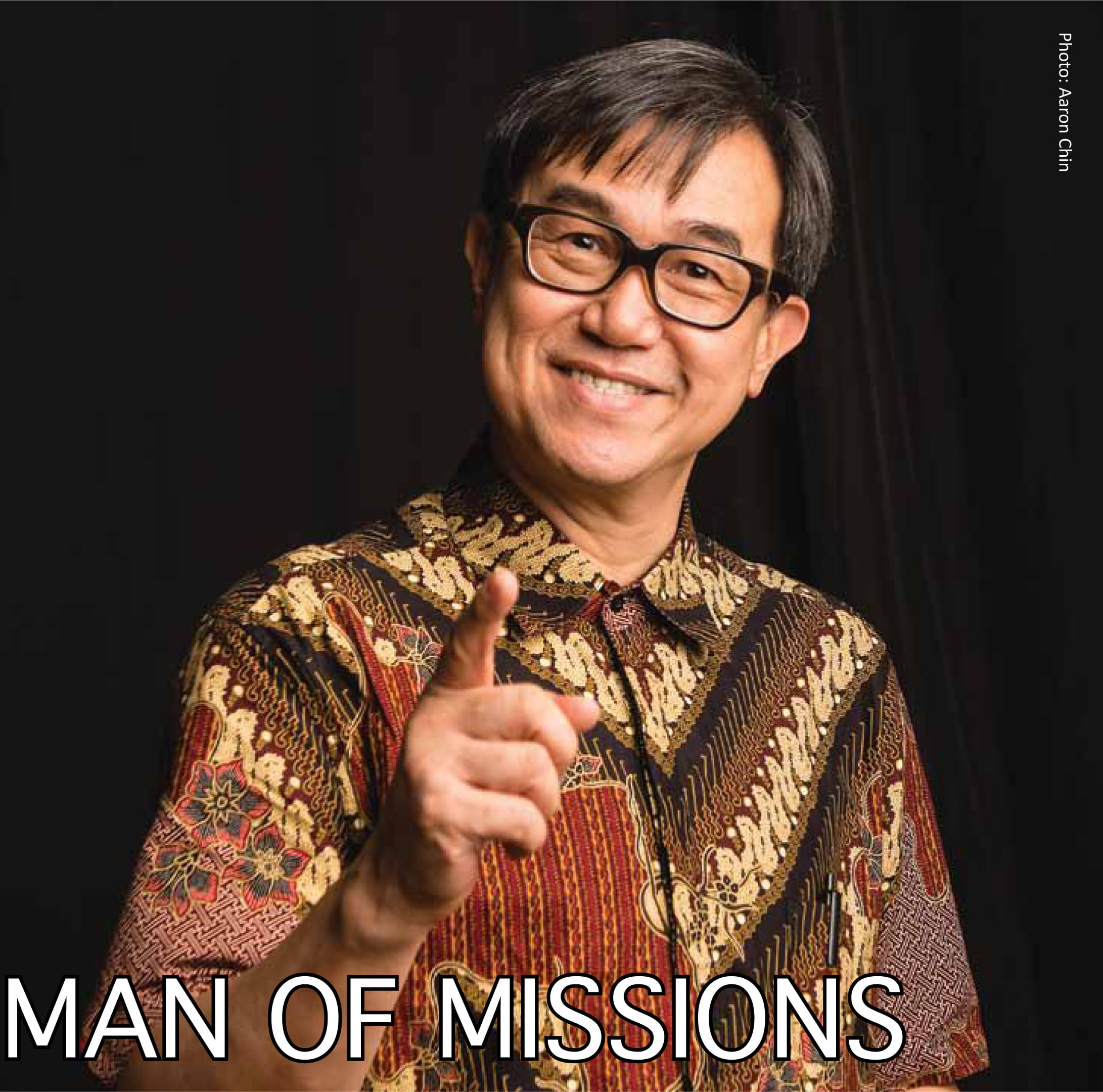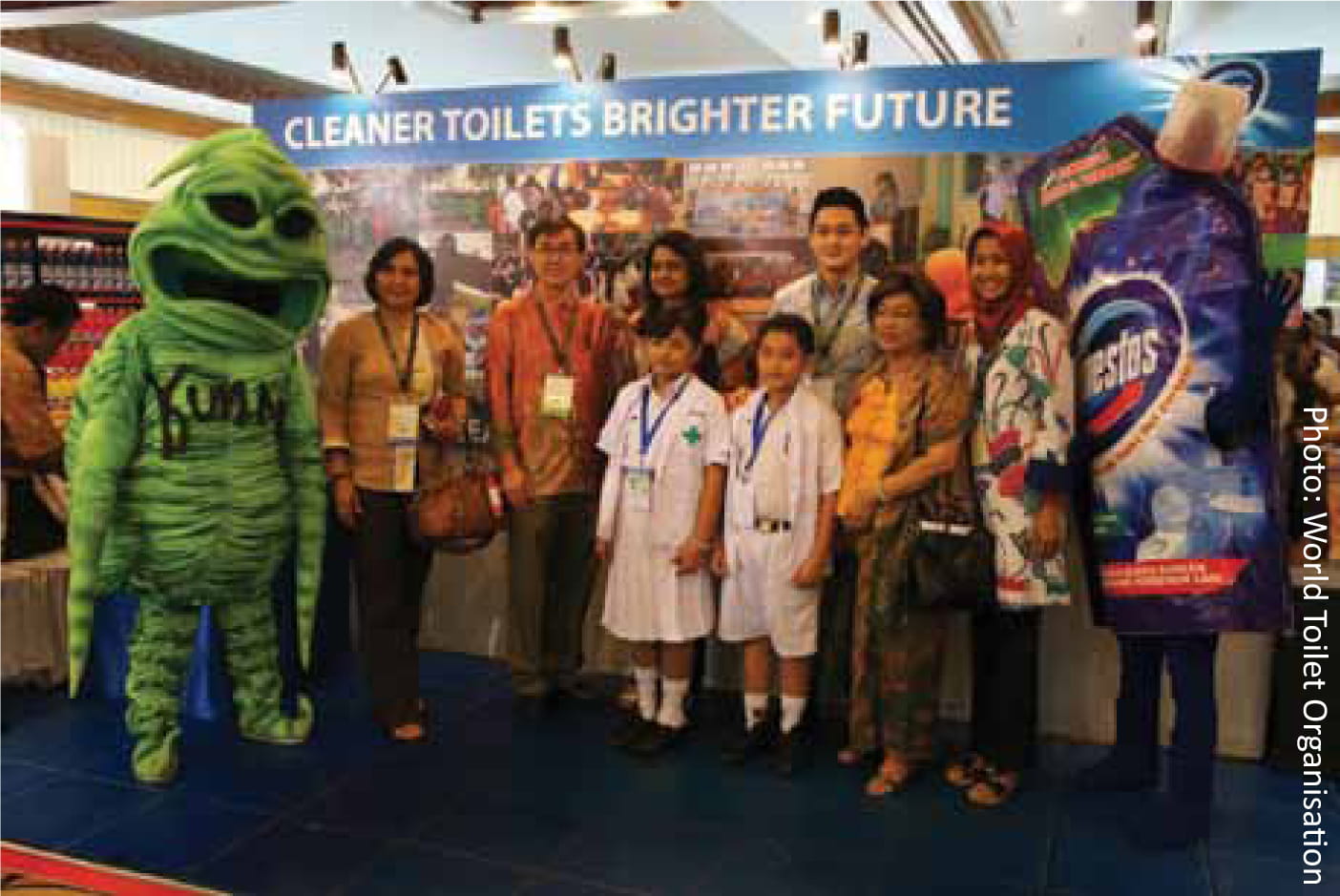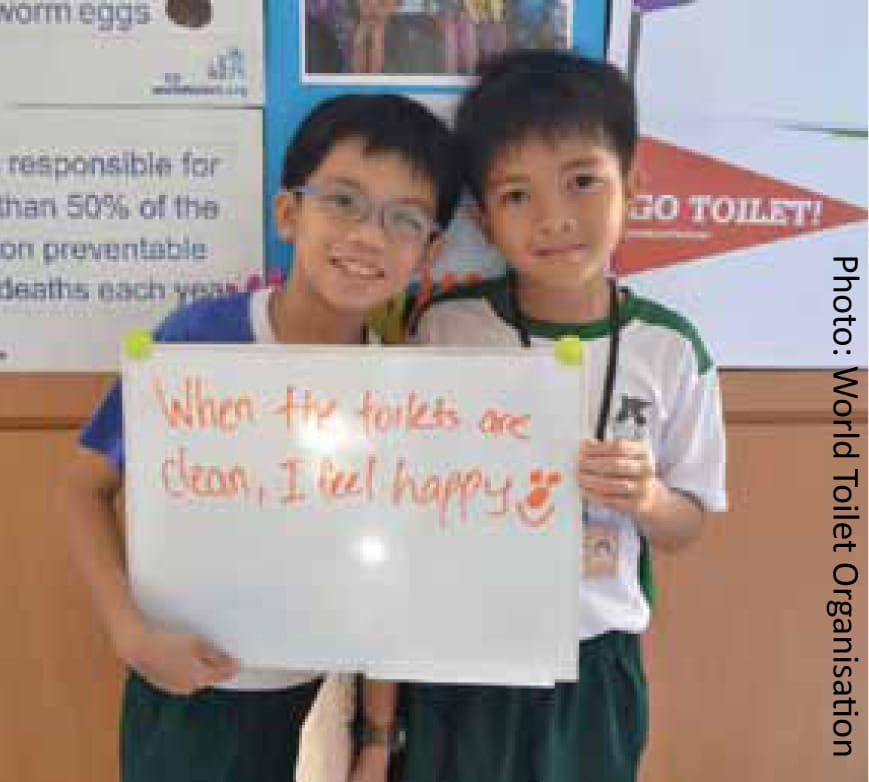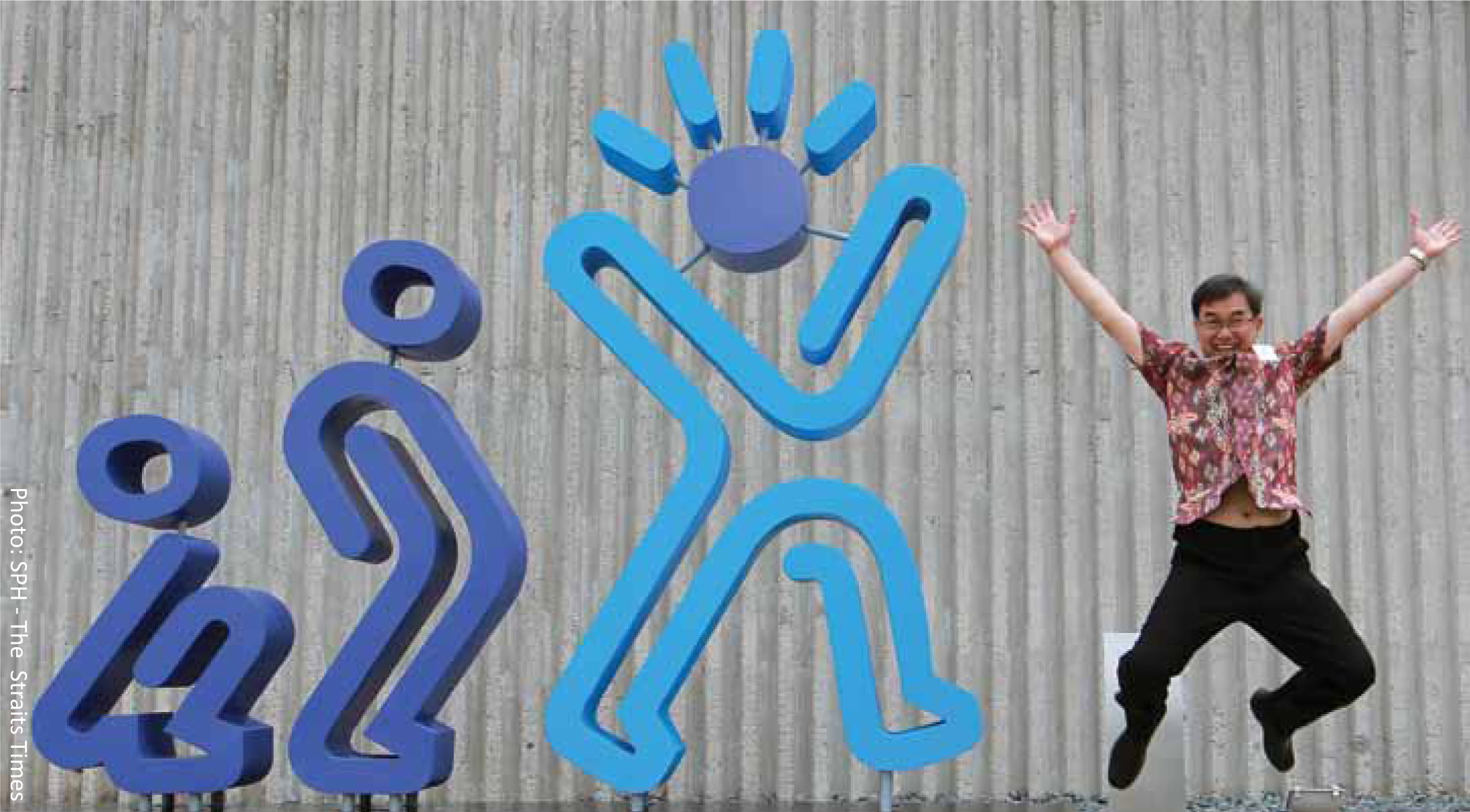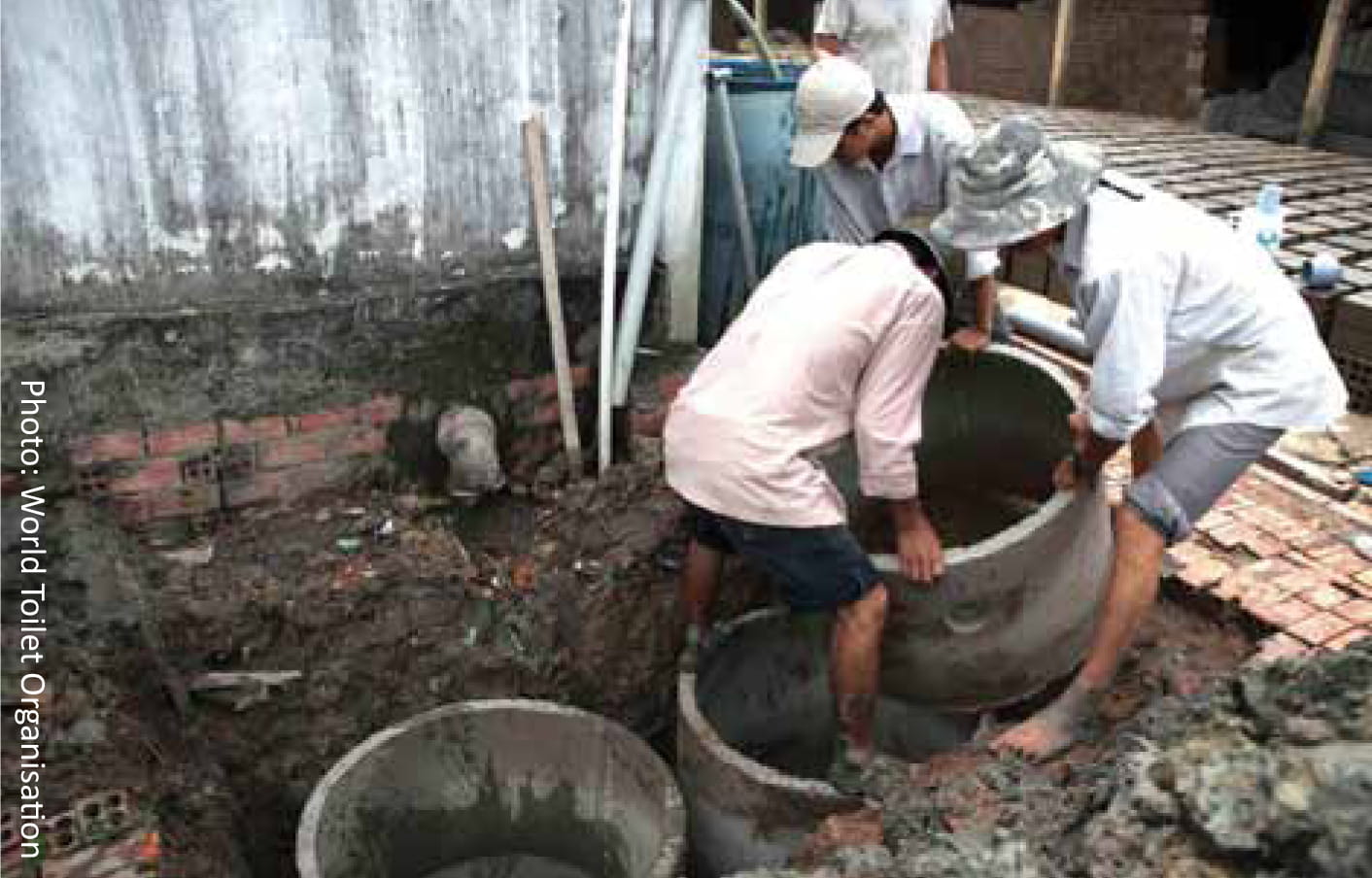Stories > Man of Missions
Man of Missions
Mr Toilet Man, Jack Sim’s mission has taken a global agenda of improving sanitation beyond Asia Pacific.
Jack Sim, known as ‘Mr Toilet’ to the world, is a serial entrepreneur who turned serial social entrepreneur when he saw the possibilities in pursuing a greater purpose.
By Kim Lee
ack Sim, Singapore’s iconoclastic Toilet Man and founder of the ‘other’ WTO — World Toilet Organisation — shares simple philosophies and real life stories in Simple Jack, a book drawn from the journey of his life; a life that has grown beyond his well-known mission of improving global sanitation.
Today, besides keeping himself busy with the WTO, he’s working on an electronic version of Simple Jack, the Restroom Association (Singapore), World Toilet Summit, World Toilet Day, SaniShop, Dialogue in the Dark, Kampung Temasek, BoP (Base of Pyramid) Hub, BoP Design Center and BoP World Trade Convention 2014. Fueled by his desire to ‘live a useful life’, each initiative seeks to solve social or environmental problems.
Edu-tainment is the new front in his sanitation mission. He wrote Everybody’s Business, a movie produced by Jack Neo that opened recently in cinemas on 5 December. Coming up is Life without Toilets, a full-length Bollywood film he wrote that will be shot in Bihar, complete with songs and dances. Sim says, “It’ll change the way Indians and the whole world look at the sanitation crisis.”
So, how does ‘Mr Toilet’ look at the world?
At the World Toilet Summit 2013, Sim, second from left, was the keynote speaker. The focus of this summit was to improve the standard of sanitation as a means to alleviate poverty and improve hygiene levels in rural and urban societies.
SG: What have you learnt from being the ‘Toilet Man’?
Sim: The title is an honor. It gives an identity to my role in society — to turn the neglected agenda of toilets and sanitation into a top priority. I’ve learned that the world focuses on agendas like fashion changes according to seasons — one year, it’s AIDS HIV, next year it’s Global Warming, and when they find some areas cooling, they change it to Climate Change…. Some agendas are charismatic: the environment, animals like the panda and the whale, water, mountains, etc. The problem is that people like to hear about green (environment) and blue(marine) issues but not brown issues. Sh*t is ugly. Diarrhoea is unpalatable, even though it kills a million children every year. People don’t like to discuss these low-caste agendas of sanitation, polio, AIDS HIV. AIDS was untouchable until Richard Burton died of it and Elizabeth Taylor stood up to speak about it. Polio was recently taken up by Bill Gates and Rotary International. We’ve come a long 13 years since I started the WTO (World Toilet Organisation) and along the way, Gates is reinventing the toilet, Matt Damon went on a toilet strike, and President Clinton made a joint commitment for the World Toilet Organisation at the Clinton Global Initiatives. With passion and legitimacy, the mission has become a revolution.
SG: You’ve mentioned time being the currency of life in a past interview. What made you realise this?
Sim: When I was 40, I looked across Meyer Road where I live, and said to myself, you’ll never be the richest man on this street. But once your stomach is full and there’s shelter over your head, you can choose a more meaningful life than chasing dollars. Singaporean men die at 80 and women at 84. I was already 40 with only 40 years — that’s 14,600 days — left to live. I asked what I would like to say to myself at my death bed; what kind of journey I wish I could have travelled. It became urgent to search for meaning. I’d rather exchange time for something more valuable than money: Love — love for humanity, love for others, love for family and lastly, love for self. In that order, humility makes cravings for self a lower priority.
“People like to hear about green (environment) and blue (marine) issues, but not brown issues.”
SG: How have you seen sanitation change Singapore?
Sim: I grew up with the British bucket system, which is terrifying for a child — to see all the different colours of other people’s excrement, dysentery blood and intestinal worms. When we moved from our attap huts to our first HDB flat, the flush toilet made us feel like wealthy people. When I was 40, Prime Minister Goh Chok Tong said we should measure our graciousness against the cleanliness of our public toilets. So, I started the Restroom Association (Singapore) to clean up Singapore’s public toilets.
After that, I realised there were 15 other toilet associations around the world without headquarters. I offered to form the World Toilet Organisation and we created an instant world body without any money, staff or authority. The media gave me all the legitimacy we needed. Eventually, the brand became reality when supporters all over the world started speaking out and taking action.
Two Yio Chu Kang Primary Schoool students take part in the ‘celebrate the toilet’ programme aimed at promoting clean toilets and heightening awareness of better sanitation. It was organised by WTO and Wash United (a Berlin-based NGO) to promote the importance of clean and safe toilets in schools. The campaign, which attracted 800 students, was part of the school’s annual exposition — School Values in Action — in November 2013.
SG: What were the three biggest lessons you’ve learned from life, and its biggest surprise for you?
Sim: One, success is not measured by the amount of goods, but by the amount of good you produce.
Two, happiness happens when your occupation becomes your pre-occupation.
Three, you stay young by thinking like a child. You become old when you think like an adult. Thus, adults are deteriorated children.
My biggest surprise was the degree of extreme dysfunction of society, especially in the social sector. While the mantra of innovation is everywhere, the status quo is threatened by social innovations. In the process, the social innovator is branded as controversial or a trouble-maker. This stifles the spirit of social innovation, resulting in missed opportunities and people getting frustrated.
To be fair, in the last two years, Our Singapore Conversation has made the government start a listening culture. Listening is an act of generosity and trust. But as the government adjusts to the people, the people have to adjust to the improved government too. Memories of pain and distrust take time to heal, so the process will need plenty of assurance. I’m optimistic that we are moving in the right direction. It is a time to be proud as a Singaporean. As our democracy matures, our social capital will be stronger than any Western-style democracy, because Singapore has a proven track record of efficiency unprecedented in any country.
SG: Does the international scope of your work make you feel like a global citizen?
Sim: A Singaporean innovator is undervalued at home and worth more overseas. This is the ‘Carpenter’s Son Syndrome’ where prophets are not welcome at home, as told in the Bible. So I am very at home overseas because my ideas are more readily accepted than here. Yet, when we see how Westerners receive higher respect for saying the same things, we feel sad. I want to build our own country first, but I end up building other countries first. Nonetheless, good done anywhere is good in any case. So I try to see myself as a global citizen. However, one’s love of one’s homeland is impossible to erase, so for years it felt like an unrequited love. At one point, I wanted to escape this pain by migrating to Australia. However, with the government’s new attitude, I feel much better. I’m glad I did not migrate. A good person loves his family, country, world and planet all at the same time.
SG: Do you see yourself as a trailblazer?
Sim: I see myself as a dreamer who peddles his dreams to others. I can’t change anything alone. By using leverage, I ask others to take these dreams and own them. If my sales are good, society improves faster. I manufacture more useful ideas and sell them again. Often I sell the same idea to many people, but new ideas come every week. So I write them down and wait for the right partner. I don’t care what they call me. I care more about how society can be fairer, and how opportunities can be harvested for the greater good. It’s about the mission.
Sim expressing happiness with a leap in the air. He’s posing next to Evolution of Man: Poo Pee Happy, a stainless steel sculpture commissioned by World Toilet Organisation. The sculpture by South African artist Dave Holland, located at the Marina Barrage, was unveiled on 19 November, designated by the UN as World Toilet Day, which was initiated to raise awareness of the global sanitation crisis.
“I’m optimistic about young people. I think they’re more altruistic than my generation, less prejudiced, more connected, globally informed and have the capacity for greater impact.”
WTO pioneered SaniShop — a social enterprise that aims to improve sanitation conditions globally. Based on a ‘social franchise’ model, it involves training local masons in developing countries like Cambodia to build and sell toilets to their community. In 2012, the SaniShop ecosystem built 1,800 toilets across Cambodia and they continued to build more toilets throughout 2013.
SG: What do you think Singaporeans need to learn to rise in these times?
Sim: I’m optimistic about the young people. I think they’re more altruistic than my generation; less prejudiced, more connected, globally informed and have the capacity for greater impact. At the same time, it’s sad to see their addiction to electronics and time wasted on gadgets. They need to connect with the outdoors and nature more so they can get some balanced input. Information and Communication Technology(ICT) was supposed to make people more productive, but with the ‘Always On’ culture, ICT has become the new drug. It’s very bad for health. Just wait for the extreme burn-out to happen. People will stop wanting to be machines. They’ll want to be people again.
SG: How did you go from serial entrepreneur to serial social entrepreneur, and has it changed your view of business?
Sim: I’ve discovered that it is better to trust my feelings rather than my thinking. Thinking is too slow and too rational. In feeling, I summon all the wisdom of my ancestors embedded in my DNA and can decide very swiftly what’s good and what’s not. It gets better with practice. In my case, the batting average of accuracy from feelings is much higher than accuracy from thinking.
I think big businesses are at a stage where they’ll have to care for society or perish. Companies with good karma will survive and companies with bad karma will self-destruct. Big companies can influence their suppliers and vendors which are smaller companies, so the supply chain can eventually be better. As consumers become more discerning, more socially conscious and environmentally involved, they will scrutinise every detail. With social media, it’ll be hard to hide information or bullsh*t them for long.
So we’ll see the convergence of economic and social goals. That’s why I started the BoP Hub, to bring businesses to the Base of Pyramid or poverty marketplace of four billion new customers. I think the timing is right to include the poor into our formal economy and sell them products that are better, cheaper and nicer than those they currently have access to.
SG: How did the 1997 Asian financial crisis affect you?
Sim: I started my first business when I was 24 and went on to found 16 more, all profitable. It seemed so easy. I leveraged on other people’s talent, money and time to be my partners. All my partners kept coming back for more investments and I felt ‘clever,’ with the Midas touch. But when the recession hit, I realised that it was the economic growth cycles that had profited me. In the recession, I was not ‘clever’ anymore. I became restless and almost depressed as the recession dragged on. All my partners wanted to sell their shares or close the companies because they saw no future. I had to double mortgage my houses for funds to buy them out. I didn’t want to close down because there were so many jobs at stake and the staff and their families relied on them. It was the most stressful episode of my life.
To get some sanity, I started World Toilet Organisation on top of the Restroom Association (RAS). My staff thought I was crazy to do more volunteer work when there were so many problems at the office. For me, WTO and RAS made me feel useful. I survived the storm, but when the economy returned, I was exhausted with the businesses. Social work was so much more energising. I quit active business and devoted myself full-time as an unpaid volunteer for all these endeavours.
SG: In championing better toilets for Singapore, what have you deduced?
Sim: The vast majority of Singaporeans are wonderful, caring and socially responsible people. If we praise and acknowledge them more, these positive strokes will bring about national pride and even better behaviour. We must not let a few become representative of the whole. Solving the public toilet cleanliness issue requires ownership of the toilet. Instead of blaming users, we need to mobilise everyone to take action. I suggest everyone reading this to go and watch the movie Everybody’s Business and tell me how everyone can take part.

